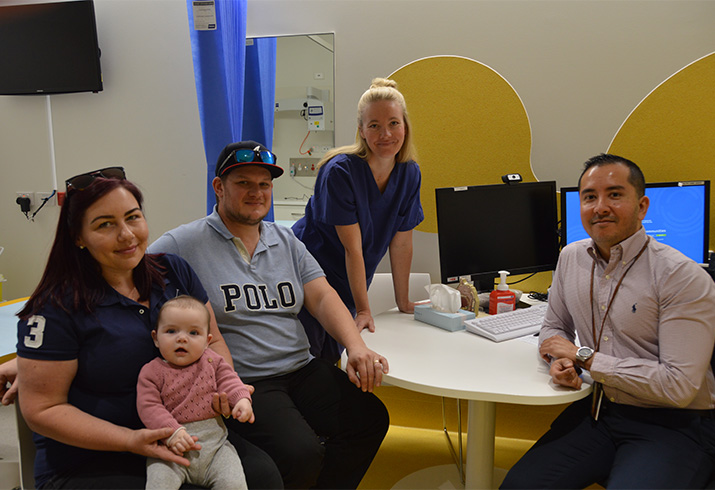Research project shedding light on virus causing hearing loss in newborns
 Lacy and Reece Swan with their baby, Charlotte and PCH clinicians Dr Allison Reid and Dr Jafri Kuthubutheen
Lacy and Reece Swan with their baby, Charlotte and PCH clinicians Dr Allison Reid and Dr Jafri Kuthubutheen
When baby Charlotte’s cochlear implants were turned on for the first time, her mum said her face lit up with wonder.
Charlotte has been part of a Perth Children’s Hospital (PCH) hearing loss study on a virus linked to childhood hearing loss called cytomegalovirus (CMV).
Lacy Swan says she believes her decision to allow her newborn baby to have a simple saliva swab for research into the virus, was crucial in expediting a diagnosis of profound hearing loss and giving them early access to excellent care and support.
Charlotte started off with tiny hearing aids at only eight-weeks-old and has now had cochlear implants fitted at nine-months-old.
“Charlotte will be able to hear us sing her happy birthday on her first birthday,” said Ms Swan.
“It’s absolutely incredible - the science behind all of this is just incredible.”
After Charlotte did not pass the newborn hearing screen, the family was invited to enrol her in PCH’s ‘Targeted screening for congenital cytomegalovirus-related hearing loss in Western Australia’ research study and undergo the saliva swab at a local pathology centre.
A follow up urine test determined that Charlotte was positive for CMV, the most common infectious cause of hearing loss in children. For a small number of babies born with CMV infection, life-long hearing loss is known to occur.
The WA-first, two-year hearing loss study, - currently at the halfway point - is focused on early detection of CMV, early interventions and better outcomes.
The research team aims to determine how common CMV is in infants with hearing loss in WA, to track the hearing loss and to determine whether early diagnosis improves care and ultimately hearing, speech and language development.
Parents of babies born in WA, aged less than 21 days and who don’t pass their newborn hearing screen are being invited to enroll. CMV testing must be carried out within the first 21 days of birth to determine if the virus was acquired in utero or after birth.
The study is being coordinated by researchers at Perth Children’s Hospital, headed by Ear, Nose and Throat surgeon Clinical Associate Professor Jafri Kuthubutheen. The research is funded by a grant from the Garnett Passe and Rodney Williams Memorial Foundation.
As a result of participating in the study, at three-weeks-old, Charlotte was diagnosed as having hearing loss in both ears due to CMV.
She was also sent for an MRI and to have her eyes checked to see if CMV had affected Charlotte’s nervous system. Fortunately, those tests and scans came back with a very good result.
“It was a lot to take in in the first month of my baby’s life, but to get those answers so quickly and so directly gave us so much peace of mind and a clear direction on what assistance she could get,” said Ms Swan.
Dr Kuthubutheen said it was currently unknown how common CMV infection was in infants who received a ‘refer’ result on newborn hearing screen in WA.
However, it is estimated that CMV could be the cause of up to 20 per cent of permanent childhood hearing loss.
“If an unborn baby is infected with CMV, approximately 90 per cent will not have any health problems,” Dr Kuthubutheen said.
“For some babies, however, CMV can cause significant health problems such as hearing loss.
“Part of the reason for this research project is to better understand CMV and to determine how often it causes problems for babies in WA. Babies with confirmed CMV are under increased surveillance and are more likely to have their hearing loss picked up earlier and monitored closely for further decline.
“In some cases, antivirals are an option that can help reduce hearing loss and prevent neurological complications.”
The results of the CMV study will be used by PCH researcher Dr Allison Reid to complete a master’s degree through The University of Western Australia. Study supervisors are Associate Professor Asha Bowen, Professor Peter Richmond and Associate Professor Chris Brennan-Jones and Dr Jafri Kuthubutheen.
Image (l-r): Lacy and Reece Swan with their baby Charlotte pictured with PCH clinicians Dr Allison Reid and Dr Jafri Kuthubutheen.

